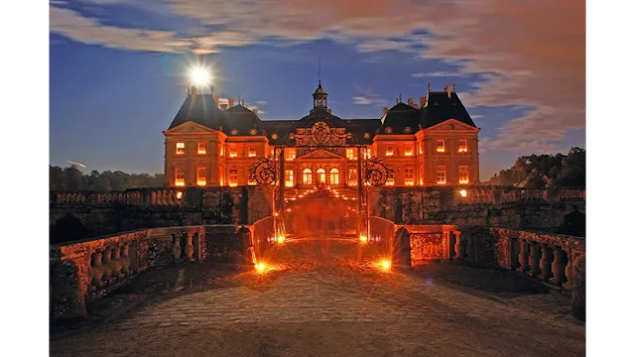A Real Estate Story
France and Fouquet are fascinating. Last week, I was seated in the Hotel Pierre's main ballroom in my designated seat. The enormous space has undergone a comprehensive renovation. It now looks like a brand-new hotel because everything about it has changed completely. The event was the annual fundraiser luncheon for the Alzheimer's Drug Discovery Foundation. The Brothers Lauder, Leonard, and Ronald, founded the ADDF in 1998 to develop a treatment for the illness.
I was seated next to Susan Gutfreund while I waited for the event, admiring the incredible modifications to the ballroom, and she pointed out the new, enormously gorgeous chandeliers. Le Cont chandeliers, according to Susan, are hand-blown, handcrafted in Italy, and made of glass. And really unique.
She used the word "come," which I mistook for the renowned French chateau Vaux-le-Vicomte. She repeated it louder for my ears after realizing I hadn't heard her correctly the first time. She noted that, coincidentally, she also adored Vaux-le-Vicomte.
I confessed to her my fascination with Vaux-le-Vicomte. It might be anyone. After all, it is a gorgeous palace with a grand ironic tale, surrounded by beautifully designed gardens.
Susan claimed that in addition to having those feelings, in 1979 she hired the palace's dining room and threw a supper for 18 people to honor her husband John's 50th birthday. Guests included a Rothschild and an Agnelli.
It was the first time the room had been "rented out" for a special occasion in the estate's four generations of family ownership. And it so happened that Susan was hosting a dinner on a Friday night for Alexandre de Vogüé, one of three brothers who had inherited the estate from their father, who had inherited it from their grandfather, who had inherited it from their great-grandfather, who had bought the property in the middle of the 19th century during a time of hardship. great-grandfather, from whom the wealth originated obtained many of its priceless works of art, furniture, and décor from sugar.
Aside from its beauty and age, it is a location with a narrative that has been told for generations and is now legendary in France.
One Nicolas Fouquet, an aristocrat like those who served the monarch, was the creator of Vaux-le-Vicomte. He was renowned for his cunning, audacity, and most of all, his loyalty to the monarchy.
He had been employed by Cardinal Mazarin, the de facto ruler of the monarchy in charge of Louis, who was born in 1638 and would succeed to the throne five years later.
Nicholas Fouquet was appointed to oversee the French treasury, which had been in serious danger, as a result of the Cardinal's policies. overspending on the military and palaces for the titled and wealthy. And the generals get medals.
Working closely with Mazarin's private secretary, Jean-Baptist Colbert, who was also four years Fouquet's junior and in his early 20s, he was tasked with restocking the French coffers.
Fouquet would have been the next in line to become Chief Minister following the death of Cardinal Mazarin in 1661. However, Louis XIV, who was now 22 and of legal age to do so, opted to eliminate the position, giving himself complete authority over the French state at that age.
When Fouquet was in his early 40s, he was still doing well. He was very wealthy and had wed a member of the wealthiest family in France. He married another girl from his class who was also very wealthy when she passed away and left him her inheritance.
He had started to build his mansion in the interim. He perceived its magnificence as a manifestation of France's glory. In the such style of thinking, he was not unique among his contemporaries in terms of influence. That unique perspective on life is still present among us; occasionally, it appears right in front of us.
Colbert, who was envious of Fouquet's success, discovered a way to alter the authority that his competitor wielded. He started early, charging Fouquet with stealing millions. Actually, Mazarin, who lived in opulence to surpass any monarch, was the one who stole it. He passed away with great wealth.
Nevertheless, despite the cautions of his friends, Fouquet was unaware that a conspiracy was developing.
On the evening of August 17, 1661, Nicolas Fouquet welcomed the world to his new estate and threw a grand party at Vaux-le-Vicomte in honor of Louis XIV.
Unbeknownst to him, just a few days before, Louis XIV had decided to imprison Fouquet with his "total power," stepping in where Colbert was unable. He went to the supper prepared for him and enjoyed it immensely, strolling through the gardens, eating, and seeing a play before watching the entrancing fireworks.
"On August 17, at six in the evening, Fouquet was King of France, at two in the morning, he was nobody," the famous author Voltaire would later pen.
Fouquet was captured in Nantes three weeks later by D'Artagnan, the King's musketeers' captain. The trial seemed to go on forever. The judges ultimately decided to exclude him from France.
But King Louis XIV had different plans. He stepped in and used his right to override the judges. In its place, he handed down a life sentence. This was the only instance in French history where a monarch worsened the sentence through pardoning. After that, Fouquet was imprisoned at Pignerol, where he passed away on March 23, 1680. At 65 years old, he was.
A century later, Nicholas Fouquet's dream palace was outclassed, outshone, and diminished by the masses, which forced Louis XVI and his Queen Marie Antoinette from the palace Louis had constructed for himself. Nicholas Fouquet never got to experience the court beyond the dream.



.webp)

Comments
Post a Comment